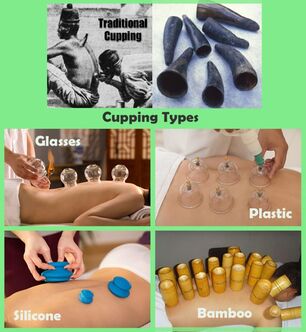 Cupping is an ancient remedy dating back to 1550 BC. The oldest medical book in the world The Ebers Papyrus describes the Egyptians’ use of hijamah (cupping). In China, the earliest description of horn method (using animal horn) was in book Fifty Two Diseases from Han dynasty (202 BC). Over 2000 years, Cupping has been part of Chinese medical practice, among which are acupuncture, Qigong, herbal and dietary therapy. Cupping helps all diseases through balancing Yin Yang and energy flow. From modern medical perspective, cupping increases blood circulation. This relieves muscle tension and promotes tissue repair. Cupping is made of bamboo, glass, ceramic, silicon and plastic. There are two main categories of practice today. Dry cupping is a suction-only method. Wet cupping involves both suction and controlled medicinal bleeding. Recent years, people are enthusiastic about cupping due to famous athletes and celebrities’ engagement. However, like any therapy, it should be careful if you have skin irritation, on blood thinner, pregnant or with some medical conditions. Side effects include dizziness, nausea, skin bruise and blister. Wet cupping leads to hepatitis and HIV if the cups are not sterilized. Please check the practitioner’s training before cupping therapy. Yu Kang, LAc, RD, LD, DipOMYu first began healing studies with her parents, who are well-known doctors of Oriental Medicine in her hometown Zibo -a mid-sized city in northern China. At the age of 15, she was accepted by Shandong University of Traditional Chinese Medicine as one of the youngest students in school history. After eight-year training in Western and Oriental Medicine, she graduated with a doctoral degree of oriental Medicine. Yu then went to China Academy of Traditional Chinese Medicine to be further trained in acupuncture and herbal medicine under the most influential doctors of Oriental Medicine in China. Prior to her arrival in the United States, Yu was a neurologist in Xiyuan Hospital, Beijing. Yu’s extensive training also includes a master’s degree in Nutrition from the Pennsylvania State University, and a one-year dietetic internship at the Beth Israel Deaconess Medical Center-a teaching hospital of Harvard Medical School. Yu is a licensed acupuncturist, a registered dietitian, and a certified herbalist from the National Certification Commission for Acupuncture and Oriental Medicine (NCCAOM).
1 Comment
|
Don't miss another edition of A Message from Makkah. Click the button below to join our mailing list
Contact Us for Advertising Opportunities!
Archives
January 2023
Categories
All
Our Sponsors |
Makkah International Institute
 RSS Feed
RSS Feed